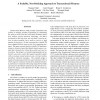367 search results - page 43 / 74 » Migrating-Home Protocol for Software Distributed Shared Memo... |
110
Voted
HPCA
2007
IEEE
16 years 3 months ago
2007
IEEE
Transactional Memory (TM) provides mechanisms that promise to simplify parallel programming by eliminating the need for locks and their associated problems (deadlock, livelock, pr...
166
Voted
IPPS
2007
IEEE
15 years 9 months ago
2007
IEEE
Search-based graph queries, such as finding short paths and isomorphic subgraphs, are dominated by memory latency. If input graphs can be partitioned appropriately, large cluster...
133
Voted
OOPSLA
2010
Springer
15 years 1 months ago
2010
Springer
As software becomes increasingly complex and difficult to analyze, it is more and more common for developers to use high-level, type-safe, object-oriented (OO) programming langua...
122
Voted
PPOPP
1997
ACM
15 years 7 months ago
1997
ACM
Global addressing of shared data simplifies parallel programming and complements message passing models commonly found in distributed memory machines. A number of programming sys...
112
Voted
ISCA
2008
IEEE
15 years 9 months ago
2008
IEEE
A high-concurrency transactional memory (TM) implementation needs to track concurrent accesses, buffer speculative updates, and manage conflicts. We present a system, FlexTM (FLE...


